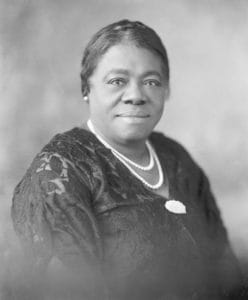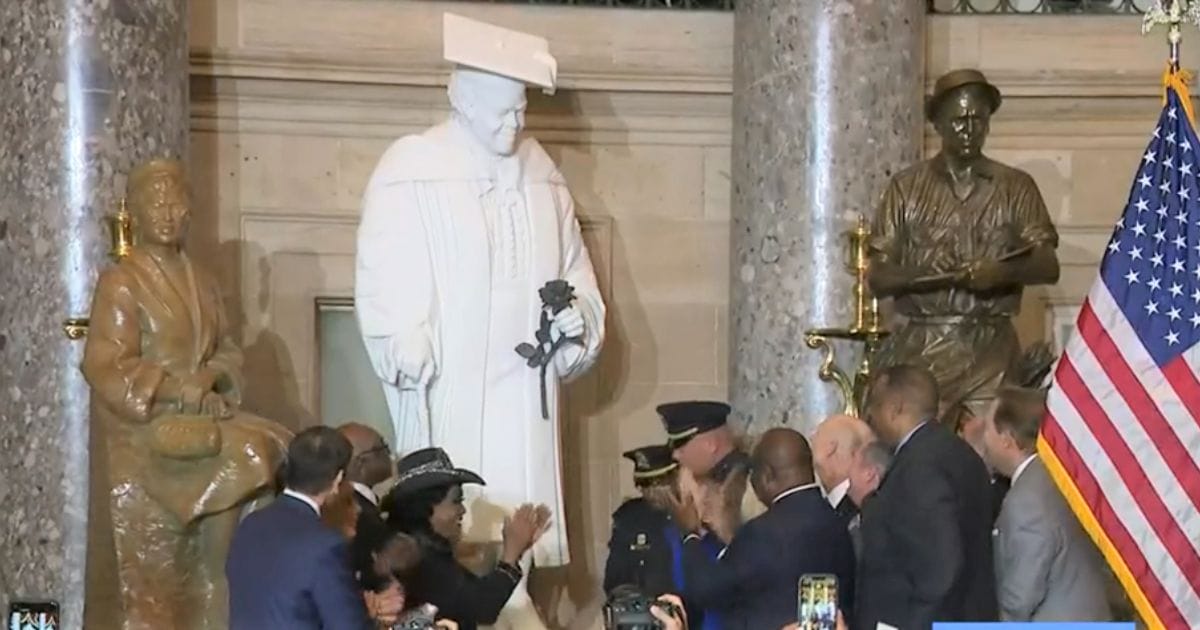Civil rights leader, presidential advisor and education pioneer Mary McLeod Bethune, whose illustrious life included ties to Chicago, on Wednesday, July 13, became the first Black person to be honored with a statue at the National Statuary Hall in the U.S. Capitol.
Sixty-seven years after her death, Bethune, who founded the Historically Black Colleges and Universities (HBCU) Bethune Cookman University with just $1.50, was honored when an 11-foot-tall marble statue of her likeness was unveiled at Statuary Hall. The statue replaces that of Confederate General Edmund Kirby Smith of Florida.
Florida Congresswoman Frederica Wilson was among the dignitaries who attended the historic unveiling that shows Bethune in a cap and gown holding a rose in one hand and in the other a cane that became part of her image in her golden years.
“The people of the state of Florida have sent the great educator and civil rights leader Dr. Mary McLeod Bethune to represent our dynamic and diverse state, the first to be represented by a Black American in National Statuary Hall.
“Dr. Bethune epitomizes the values we hold dear: industriousness, thirst for education, desire to build peace among people. She devoted her life to equal rights and service, service to presidents, but to students, women, her race, veterans and everyday Americans.”
Bethune is not the first Black American in the Capitol building. There are also statues of busts of Martin Luther King Jr. in the Capitol Rotunda and Sojourner Truth in the Capitol Visitor Center, along with Abolitionist Frederick Douglass. Civil rights activist Rosa Parks’ statute is in Statuary Hall, but it is not part of the official National Statuary Hall Collection.
The National Statuary Hall is one of the most revered places in the Capitol. Statues of Confederate generals and soldiers still flank the opulent room, but an ongoing movement to replace them with distinguished individuals has gained steam in recent years. Bethune is the latest pioneer to receive that honor.
Only governors and state legislatures can remove statues and replace them in Statuary Hall. Former Florida Governor Rick Scott and his Republican Legislature approved Bethune’s honor years ago.

The historic unveiling came three days after Bethune’s birthday. She was born to enslaved parents on July 10, 1875 in a cabin in Maysville, South Carolina. She had 16 siblings and despite her humble circumstances, was the only one able to attend a mission school for Blacks in North Carolina.
She received a scholarship to attend Scotia Seminary, in Concord, North Carolina. In 1894 she was admitted to what is now the Moody Bible Institute on Chicago’s North Side. She was the only Black student at the school and had a white roommate who told her that she “didn’t know that colored people were fair on the bottom of their feet,” according to Moody’s website, which said the two went on to “develop a lasting friendship.”
Bethune entered Moody for missionary training. Her hands-on experiences included setting up Sunday schools in neglected areas of Chicago, working among prisoners in the city jails, and helping at the Pacific Garden Mission, a homeless shelter that today is located on the Near West Side.
The Pacific Garden Mission operated 24 hours a day, accommodating as many as 200 drop-ins with food, coffee, a bath, and clean clothing. Through these experiences, Bethune yearned to be a “fisherman of men” who could direct people into the “path of right living.”
While in Chicago, Bethune wrote a weekly public affairs column for the Chicago Defender.
She had seen America from the failed Reconstruction period to the rise of the Civil Rights Movement. She defied the Ku Klux Klan to lead people to the polls after the ratification of the Woman’s Suffrage Amendment in 1920.
While at Moody, Bethune wanted to be a missionary, but no one was willing to sponsor a Black woman to serve in that role. Bethune became an educator. While teaching in South Carolina, she married fellow teacher Albertus Bethune, with whom she had a son in 1899.
The Bethunes moved to Palatka, Florida, where Mary worked at the Presbyterian Church. When her marriage ended in 1904, Bethune, determined to support her son, opened a boarding school with just $1.50. The school was the Daytona Beach Literary and Industrial School for Training Negro Girls.
After a rocky start, the school expanded to a 32-acre campus with 14 buildings and 400 students.
In 1929, the school merged with the all-male Cookman Institute to form Bethune-Cookman College in 1929. It issued its first degrees in 1943. In 2007, the school changed its name to Bethune–Cookman University.
A champion of racial and gender equality, Bethune founded many organizations and led voter registration drives after women gained the vote in 1920, risking racist attacks.
In 1924, she was elected president of the National Association of Colored Women’s Clubs, and in 1935, she became the founding president of the National Council of Negro Women.
Bethune also played a role in the transition of Black voters from the Republican Party to the Democratic Party during the Great Depression. She was a friend of Eleanor Roosevelt. In 1936, the first lady’s husband, President Franklin D. Roosevelt named her director of Negro Affairs of the National Youth Administration, where she remained until 1944.
She was also a leader of FDR’s unofficial “Black Cabinet.” In 1937, Bethune organized a conference on the Problems of the Negro and Negro Youth, and fought to end discrimination and lynching.
In 1940, she became vice president of the National Association for the Advancement of Colored Persons (NAACP), a position she held for the rest of her life.
As a member of the advisory board that in 1942 created the Women’s Army Corps, Bethune ensured it was racially integrated. Appointed by President Harry S. Truman, Bethune was the only woman of color at the founding conference of the United Nations in 1945.
Bethune was also a businesswoman who co-owned a Daytona, Florida resort and co-founded the Central Life Insurance Company of Tampa.
Honored with many awards, Bethune’s life was celebrated with a memorial statue in Washington DC in 1974, and a postage stamp in 1985. Her final residence is a National Historic Site.
Bethune died of a heart attack on May 18, 1955. She’s buried on the campus of Bethune-Cookman University, the school she founded.






